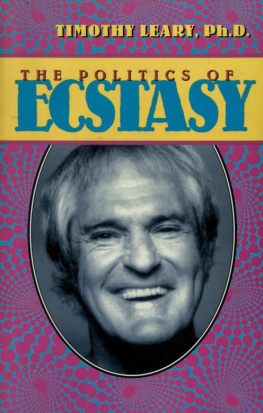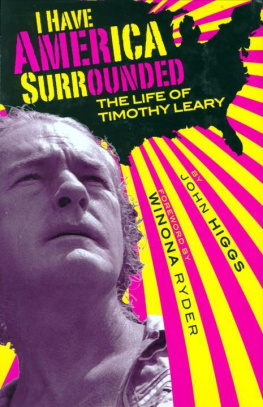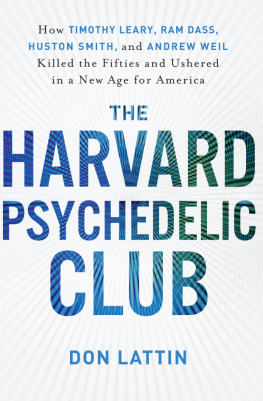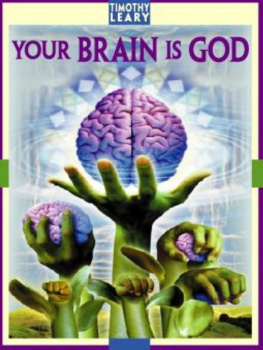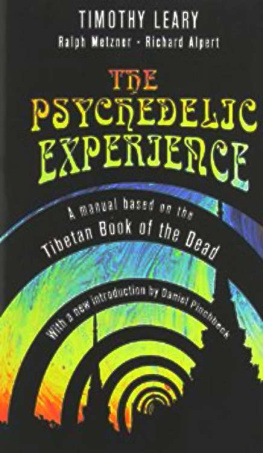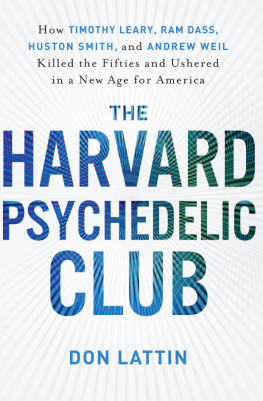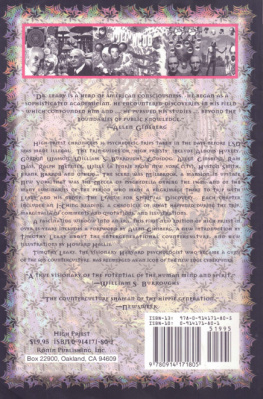Ulrich Jennifer - The Timothy Leary Project
Here you can read online Ulrich Jennifer - The Timothy Leary Project full text of the book (entire story) in english for free. Download pdf and epub, get meaning, cover and reviews about this ebook. year: 2018, publisher: Abrams, genre: Romance novel. Description of the work, (preface) as well as reviews are available. Best literature library LitArk.com created for fans of good reading and offers a wide selection of genres:
Romance novel
Science fiction
Adventure
Detective
Science
History
Home and family
Prose
Art
Politics
Computer
Non-fiction
Religion
Business
Children
Humor
Choose a favorite category and find really read worthwhile books. Enjoy immersion in the world of imagination, feel the emotions of the characters or learn something new for yourself, make an fascinating discovery.
- Book:The Timothy Leary Project
- Author:
- Publisher:Abrams
- Genre:
- Year:2018
- Rating:3 / 5
- Favourites:Add to favourites
- Your mark:
- 60
- 1
- 2
- 3
- 4
- 5
The Timothy Leary Project: summary, description and annotation
We offer to read an annotation, description, summary or preface (depends on what the author of the book "The Timothy Leary Project" wrote himself). If you haven't found the necessary information about the book — write in the comments, we will try to find it.
The Timothy Leary Project — read online for free the complete book (whole text) full work
Below is the text of the book, divided by pages. System saving the place of the last page read, allows you to conveniently read the book "The Timothy Leary Project" online for free, without having to search again every time where you left off. Put a bookmark, and you can go to the page where you finished reading at any time.
Font size:
Interval:
Bookmark:

Text 2018 Elephant Book Company Limited
Cover 2018 Abrams
All original documents within the book, including photographs, archival documents and transcriptions of archival documents are of the acknowledged estate holders as detailed on .
Conceived and created by Elephant Book Company Limited.
Published in 2018 by Abrams Press, an imprint of ABRAMS. All rights reserved. No portion of this book may be reproduced, stored in a retrieval system, or transmitted in any form or by any means, mechanical, electronic, photocopying, recording, or otherwise, without written permission from the publisher.
Library of Congress Control Number: 2017949749
ISBN: 978-1-4197-2646-0
eISBN: 978-1-68335-167-2
Abrams books are available at special discounts when purchased in quantity for premiums and promotions as well as fundraising or educational use. Special editions can also be created to specification. For details, contact specialsales@abramsbooks.com or the address below.

ABRAMS The Art of Books
195 Broadway, New York, NY 10007
abramsbooks.com
Getting the Timothy Leary you deserve, one piece of paper at a time
Everyone wants to know what their parents are up to growing up. As you get older and more inquisitive you naturally want to know how your birthers live in this world. What is it that they do? Who are their friends? Naturally, osmosis starts to take hold and the things our parents are into, we also get attracted to. Thats the way the human condition works. Programming and metaprogramming.
During my youth, a certain mystery surrounded my upbringing. I grew up in what appeared on the outside to be a somewhat normal upper-middle-class household in Beverly Hills, California. Every morning my mom or dad would take me to school, my dad would toss the baseball with me in the backyard and on most nights they would make sure I did my homework.
Something changed at around the age of thirteen. During the 1980s, my dad supplemented his income by being an actor in a number of pretty bad B movies. On one of these assignments, I accompanied him to the set at Universal Studios. As I was standing around watching the shoot take place some guy, presumably a crewmember, stood beside me and also watched the scene being shot. Not knowing who I was, he turned and spoke to me in a very calm and deliberate manner and said, I cant believe they have this evil, disgusting man in this movie. The amount of damage hes done to this country is incredible. Im paraphrasing of course, but that was the gist of it.
I was shocked, terrified, confused, and exhilarated. Even at that age I knew that in order to generate that kind of response from someone Timothy must have been doing something pretty exciting.
After the film-set incident, I began to take a little action to figure out what exactly Timothy Leary did for a living. I started to notice all of the books with his name on the shelf and the celebrities that hung out at our housesome of our regular visitors were fans and some people were very hung up on what he was going to say next. It was then that the realization came to mehes famous!
Growing up in Beverly Hills in the 1980s fame was a big deal. I began to see Timothy Leary as more than a father, he was also a teacher. And I must be completely honest by saying that I was intimidated by his cognitive capacity for a great many years to come.
After I read his autobiography Flashbacks for the first time at age fifteen, I could see that this was no ordinary man. He was a man on a mission who never wavered from what he believed to be his truth. He was fired from Harvard, lived on a commune, inspired the Beatles, and escaped from prison. At such an early age finding this stuff out was an incredible revelation and also quite bewildering.
Now when I saw him in his office, it was with new eyes. Every hour Timothy spent in front of the computer was poised and possessed, every note written in the margin of a book was deliberate and passionate, and every note, artifact and letter was tagged, filed, and stored in a box in the garage.
Watching him work, I slowly became aware that I was right in the middle of one of the great cultural movements of our times. While Timothy was not the cultural movement by himself, he was indeed one of its primary instigators and provocateurs. All of this material being thrown into these boxes was not just the work of one man, but they were documents that told the story of our times.
From the interpersonal psychology movement of the late 1950s to the cyberpunk movement of the 1990s, Timothy had a front row seat for some of the most important cultural movements of the late twentieth century. And the documentation of that viewpoint was an essential facet in the Timothy Leary legacy.
How the archives became such a well-documented repository of American culture is a tale that rivals any Hollywood adventure saga. They started off in metal bins, in shoddy boxes with not much labeling and passed their way through many hands before finally ending up in their current, and presumably final, resting placethe New York Public Library.
Technically speaking, the archives are made up of hundreds of boxes containing book drafts, research materials from Harvard, correspondence with amazing people, manifestos from the Millbrook era, random notes, personal mementos, photographs, digital archives from the 1980s and 90s, and lots of stream-of-consciousness thought starters that are quintessential Leary. Im sure he had a good fifty book ideas that never made it past the first few pages.
Before he became the infamous 1960s counterculture rebel, Timothy was a self-respecting psychologist. He was also a self-professed middle-class liberal robot who drove home each night and drank martinis. He had two kids, Susan and Jack, and a wife, Marianne. When Marianne committed suicide on his thirty-fifth birthday, a lightning bolt was thrust into his psyche that made his entire lifes purpose about his work and almost nothing else. Sure, he would love again and find a sliver of domestic tranquility late in life, but everything would pale in comparison and priority to the triumph that was to be his lifes work.
When Harvard University talked him into joining the faculty in 1959, he joined as an isolationist. He kept to himself and really didnt care about being there all that much. Timothy was looking to break out. He wanted to do something new. Naturally, in 1960, when the time came to turn-on and experience psychedelics for the first time at the age of forty, he was not worried about what others would think or how it might appear to the Harvard staff. Rooted in science and research, he simply did his work and wrote it all down as one big premeditated experiment in human consciousness.
When in the late 1960s, the unrest of the times reached a fever pitch due to factors ranging from the war in Vietnam to psychedelics becoming mainstream, Timothy turned from scientist to outlaw right in step with everyone else. He became the perfect man for the job of leading an antiauthoritarian crusade against the thought-police establishment.
By the time Timothy was on the run and/or imprisoned for being caught in possession of marijuana, his role as outlaw instead of a serious scientist was firmly embedded in the lexicon of popular culture. When I asked him about this, his answer to me contradicted the popular picture. Hed always tell me that his tactics, his penchant for taking on the U.S. government for control of our minds, were just as important intellectually as his groundbreaking Good Friday Experiment at Harvard in 1962. He felt that both approaches were about urging society to think for themselves and question authorityan ethos that was paramount to all his work.
Next pageFont size:
Interval:
Bookmark:
Similar books «The Timothy Leary Project»
Look at similar books to The Timothy Leary Project. We have selected literature similar in name and meaning in the hope of providing readers with more options to find new, interesting, not yet read works.
Discussion, reviews of the book The Timothy Leary Project and just readers' own opinions. Leave your comments, write what you think about the work, its meaning or the main characters. Specify what exactly you liked and what you didn't like, and why you think so.

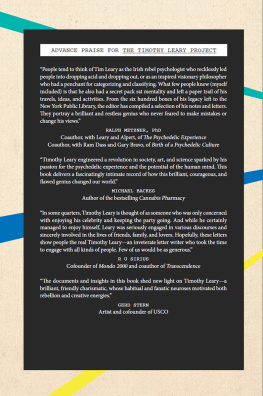


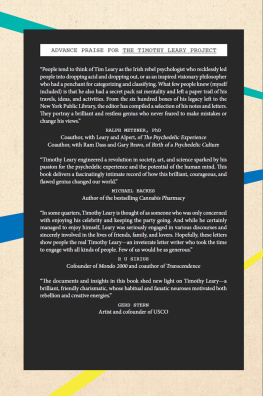
![Robert Greenfield - Timothy Leary: A Biography [excerpts]](/uploads/posts/book/113331/thumbs/robert-greenfield-timothy-leary-a-biography.jpg)
